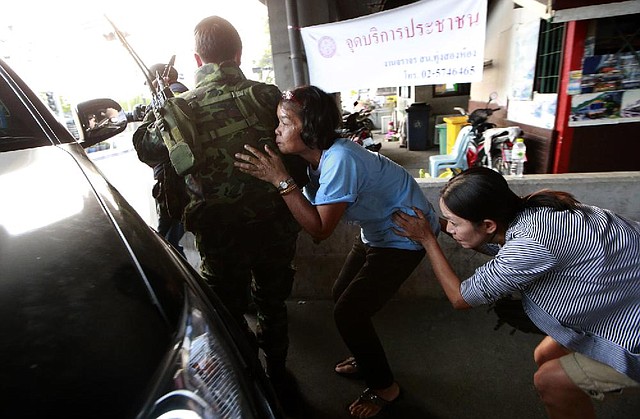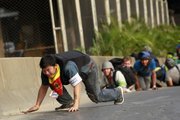Blocked polls mar Thai vote; 7 hurt in Bangkok gunfight
People take cover Saturday in Bangkok behind Thai soldiers who were sent to rescue them amid clashes between anti-government groups and government supporters.
Sunday, February 2, 2014
BANGKOK - Thailand’s tense national election got underway this morning with protesters forcing the closure of several polling stations in the capital amid fears of more bloodshed a day after gun battles in Bangkok left seven people wounded.
The extent of disruptions was not immediately clear when polls opened nationwide. But there were early indications that several hundred polling stations in Bangkok and southern Thailand,an opposition stronghold, could not open because protesters had blocked the delivery of ballots or stopped voters from entering.
Under heavy police security, beleaguered Prime Minister Yingluck Shinawatra cast her vote at a polling station in northeastern Bangkok, cheered on by supporters.
“Today is an important day,” Yingluck told reporters. “I would like to invite Thai people to come out and vote to uphold democracy.”
Casting a ballot was not as easy in other parts of Bangkok, where protesters vowed to fill the streets to prevent voters from reaching polling stations.
In Din Daeng, one of the more volatile districts of central Bangkok, a group of would-be voters tried and failed to push through a crowd of protesters.
“This is too much. I want to vote,” said 42-year
old Yupin Pintong, a Bangkok resident. “I don’t care if there’s violence. I will be really upset if I don’t get to vote.”
The risk of Election Day violence remained high a day after seven people were wounded during an hour-long gunfight that broke out in broad daylight at a busy Bangkok intersection between government supporters and protesters intent on derailing the polls. Among the injured were a reporter for the local Daily News newspaper and an American photojournalist, James Nachtwey, who was grazed by a bullet in the leg.
People caught up in the mayhem crouched behind cars and ducked on a pedestrian bridge while others fled inside a nearby shopping mall. Several masked men wearing armored vests bent down under a highway overpass as one of them fired a weapon concealed in a green sack.
The exchange of f ire was the latest flare-up in a months-long struggle by protesters to overthrow Yingluck’s beleaguered government, which they accuse of corruption.
Saturday’s confrontation began after a group of pro-government supporters marched to a district office in the northern Bangkok suburb of Laksi. The office had been surrounded by protesters intent on preventing ballot boxes from being delivered to a nearby polling station.
The army sent personnel to assist the police in Laksi, said Winthai Suvaree, the deputy army spokesman, urging “all groups to respect the law.”
Tensions mounted for hours before clashes finally broke out. As gunfire rattled the area and people screamed in fear, a mob of government supporters wielding huge sticks smashed the windshields of a car carrying protesters that sped away.
Associated Press journalists saw a gunman allied with protesters firing an assault rifle, and another firing a pistol as he lay on his stomach on the road. Sunai Phasuk, a senior researcher for Human Rights Watch, said several pro-government gunmen climbed to the mall’s rooftop and began firing down at their rivals. The two sides also fought with rocks and firecrackers.
“What is clear is that both sides had weapons, both sides were armed,” Sunai said. “This is a very worrying sign.”
Voting was abandoned in Laksi because of the gun battle, the country’s Election Commission said.
As many as 62 of Thailand’s 77 provinces will be unaffected by the protests, including Yingluck’s strongholds in the north and northeast, according to the commission. More than 47 million people are registered to vote.
In the south, where the main opposition Democrat Party has its power base, “demonstrators are still blocking post offices in Chumporn, Songkhla and Nakhon Si Thammarat,” Election Commission Secretary-General Puchong Nutrawong said. The Democrats are boycotting the election, and poll results may not be certified for months because by-elections must be held in districts where advance voting was disrupted last weekend, as well as areas blockaded by demonstrators today, Puchong said.
Suthep Thaugsuban, a former Democrat power broker who has led the three-month street campaign to oust Yingluck, had said protesters wouldn’t block polling stations today, while urging all voters to choose a side in the country’s political conflict.
“We will not vote, but we will not criticize anyone for casting their vote,” he told supporters late Saturday. “We will not block anybody who wants to cast their ballot.You can go to vote. We want to know who is on our side.”
Police officials said they’re deploying 100,000 officers nationwide today, while the army is putting 5,000 soldiers in Bangkok to boost security.
“I want to ask for cooperation from everyone to be patient, to talk to each other to prevent any clash which may lead to violence,” Yingluck said Saturday.
“I want to beg people not to block the vote because that will make us unable to answer questions from the international community.”
The conflict pits demonstrators who say they want to suspend the country’s fragile democracy to institute anti-corruption policies against Yingluck’s supporters and civilians who say the election will do little to solve the nation’s crisis but insist the right to vote should not be taken away.
The protesters are demanding that the government be replaced by an unelected council that would rewrite political and electoral laws to combat problems of corruption and money politics. Yingluck has refused to step down, arguing she is open to change and that such a council would be unconstitutional.
Since protests began late last year, at least 10 people have been killed and nearly 600 wounded.
Whatever happens, the outcome of the election will almost certainly be inconclusive. Because of the disruptions in advance voting, it’s likely the nation’s parliament will not have enough members to convene.
That means Yingluck will likely be unable to form a government or even pass a budget, and Thailand will be stuck in political limbo for months as by-elections are run in constituencies that were unable to vote.
A power vacuum may entice the military to step in and declare a coup as it did in 2006, when Yingluck’s older brother, ex-Premier Thaksin Shinawatra, was deposed. Thaksin lives in exile but has remained a central - and highly polarizing - figure in Thailand’s political strife ever since. The rural majority in the north adore him for his populist policies, such as virtually free health care, while Bangkok’s elite and many in the south consider him and his family a corrupting influence on the country. Protesters say Yingluck is a puppet of her billionaire brother.
The Democrats have argued that today’s election won’t be fair because Thaksin bought the loyalty of poor voters while in power.
Another possibility for Thailand is what is being called a “judicial coup.” Analysts say the courts and the country’s independent oversight agencies all tilt heavily against the Shinawatras’ political machine, and Yingluck’s opponents are already studying legal justifications to nullify today’s vote.
“I think probably we are moving toward a judicial coup of some sort,” said Chris Baker, a Bangkok-based political analyst and writer. “I think we are moving toward a position in which some part of the judicial machinery, be it the Anti-Corruption Commission, the Constitutional Court, some combination of this, will somehow bring down this government.”
The protests began in earnest late last year after the ruling party tried to push through an amnesty bill that would have allowed Thaksin to return from exile.
Desperate to defuse the crisis, Yingluck dissolved the lower house of the parliament in December and called new elections. But protests only intensified, and Yingluck - now a caretaker prime minister with limited powers - has found herself increasingly cornered. Thai courts have begun fast-tracking cases that could see Yingluck or her party banished from power, and the army has pointedly left open the possibility of intervening again if the crisis is not resolved peacefully.
Information for this article was contributed by Todd Pitman, Papitchaya Boonngok, Hau Dinh, Thanyarat Doksone, Chalida Ekvitthayavechnukul, Andi Jatmiko, Wally Santana and Jinda Wedel of The Associated Press; and by Suttinee Yuvejwattana, Anuchit Nguyen and Chris Blake of Bloomberg News.
Front Section, Pages 1 on 02/02/2014


